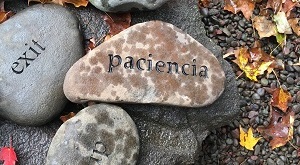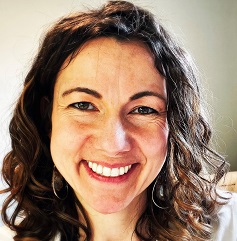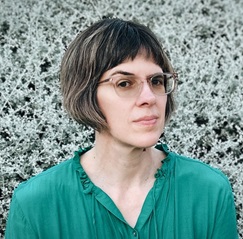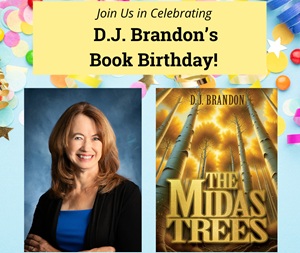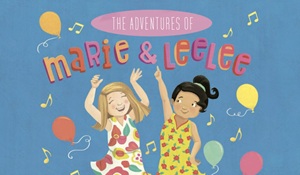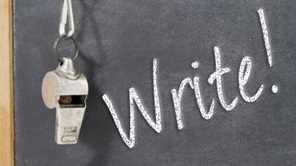Ashley Hope Pérez and Alisa Alering, faculty for our workshop Connecting Source to Story: Mining the World for Your Fiction, visit the blog today. The two are thrilled to co-teach this intense workshop designed to fill our writers’ minds with fresh ideas.
So thrilled, in fact, that instead of our traditional author interview, the two sat down in conversation about their works, no outside questions needed! They talked processes, partnerships, and, of course, what to expect from their workshop. We were lucky enough to record the ideas flying between the two.
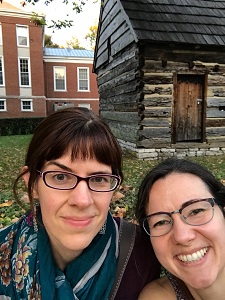
Alisa Alering and Ashley Hope Pérez
Ashley: So, I’m excited about our workshop at Highlights for all the obvious reasons — writing, meeting other writers, making source notebooks, giving others the insights we wish we’d had earlier on. But you know what else?
Alisa: You’re also excited about the cookies? And the walks? And the super magic atmosphere that makes you feel so safe and like you’re on the right path?
Ashley: Yes, all of that… especially the cookies! AND I just realized that we’re teaching our workshop on the 10th anniversary of meeting each other…. almost down to the day! (Yes, I’m nerdy enough to look up the date… it was June of 2008.) Do you remember that? Karen Joy Fowler’s fiction workshop at the Indiana Writers’ Conference? What stands out to you from that time?
Alisa: I can’t believe it’s been that long. But of course, I remember. I mean, it was the start of our friendship and our writing partnership. I think we struck gold having Karen as an instructor. I wanted to take a workshop with her back then because she seemed such a great role model for me. She had a foot in every camp. She wrote historical and popular and literary and science fiction – and excelled at all of it.
Ashley: And I remember watching Karen’s approach to mentorship and thinking, “That’s how you do it.” I still come back to lessons from that workshop. Remember how she explained using setting to escalate the stakes of conflict?
Alisa: Yes! Karen was talking about how many scenes take place at home over the kitchen table, and that’s really a waste of setting because we lose an opportunity to build tension. She walked us through an escalation. And she also shared one of my favorite examples of “source to story.” Do you remember the runaway fire engine in her book Sister Noon? It’s a real thing from early 20th-century San Francisco newspapers.
Ashley: See, I think this is a perfect example of how source and story go together. The work of building the plot beautifully intertwines with the work of scooping up rich bits from the world, what we’re talking about as “sources” in the workshop. At some point, every scene needs to get rooted in particulars, which often come from the real world. And the writer should ask herself, “How can these details also raise the stakes?”
Alisa: I love that we both remember that lesson so well… after 10 years.
Ashley: Of course we do, because we’ve reminded each other of it plenty of times. Because the best thing about that workshop was finding you! Writer friend of my heart! I remember you seemed as shy as I felt, but I’ve always overcompensated for my shyness, so I’m pretty sure I forced you to start having lunch with me. And then we switched to walking… I think we walked together at least once every week during those years we both lived in Bloomington. That was the best. We would bring our writing problems along (other ones, too). We always managed to solve something by the end of the trail.
Alisa: Moving the feet moves the blood, and that seems to unclog stale ideas, things you get stuck on. It’s even better if you have a writing buddy along to inject some Drano into the neurons. There are miles of trails at Highlights. Pack your walking shoes!
Ashley: For a decade now, you’ve been one of my most important readers. I like to think I’m one of your biggest fans, too. Some of your stories… the white houses on the island one… and the one with the girl with the helmet who draws a door in the wall in the last scene… I’ve always loved seeing how imagery, detail, and intuition intertwine in your writing.
Alisa: We definitely come at story construction from different places. I have a magpie imagination. There are dozens – if not hundreds – of ideas that I want to write and I love, love them all; it kind of breaks my heart that even if I were superfast, I’d never be able to write all of them. Whereas you seem to really only fall in love with one idea at a time and are able to hold onto it for the many years it takes to bring it to fruition.
And my ideas come from snippets. Half-glimpsed images, a phrase I can’t get out of my head, articles I’ve clipped out of newspapers about robots who can care for the elderly or the people who worked in the Soviet Lab dedicated to the preservation of Lenin’s body.
Ashley: Add all of this to the things I love about you. I’m feeling such tenderness for the way your brain works. Remember the “Art & Words” piece with the sisters?
Alisa: Ah, that takes a little set-up to explain. So Bonnie Jo Stufflebeam puts on an annual “Art & Words” show in Dallas every year that matches visual artists with writers. If you’re a writer accepted for the show, you pick one of the visual art pieces for the show and write a story from that — and then the two are displayed together at the show and the stories are read aloud.
For the story you are talking about, I got to work with a wonderful sculpture by Pam Stern. It’s this great, imaginative, thought-provoking piece of a tower of women with sort of Renaissance faces, with a village supported on their heads and shoulders. But at the base of the sculpture, sort of where the women’s upper thighs would be, there starts to be all this black scratch-work, branches, cracks, and fissures. It’s jumbled, chaotic, with skulls and fragments, a bit Boschian. And such a contrast from the serene faces of the women high above.
Of all the artwork I had to choose from, this one jumped out at me. I knew there was a story of mine in there. I was intrigued by it, but it wasn’t easy to get that story out.
Ashley: That’s important. Good sources don’t generally offer a straight line into narrative. The movement is more indirect, sometimes subterranean. I remember talking it over in the Pourhouse in Bloomington early on… you were kind of stuck at first.
Alisa: I had so many false starts. The sculpture was an image, a good, complex image with lots of nuance and emotion for me, which is a good starting place for story. I knew it had plenty of the right kind of energy. I was always excited and inspired when I looked at it. But how to get that into narrative? Story is about tension, about change and resolution, and the key ultimately lay in the contrast between the serenity and majesty of the top half of the sculpture and the scribbled chaos around the base. And so I formed questions for myself to answer: Who are these women? Who are they to each other? Why are they holding an entire village on their heads? What is the chaos at their feet? How did the two things get separated? The resulting story spills out of those questions.
(See the sculpture and the story here.)
Ashley: I love that story.
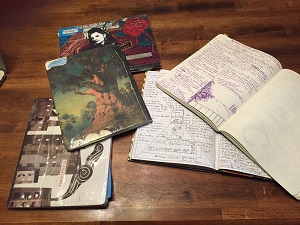
Ashley’s source notebooks
Alisa: I guess I’ve got my strategies for finding and managing “sources,” but I’ve often counted on you to help me sort out situation and character. You ground me and point out ways of raising details and consequences, helping me see past my dreamscape into the specific turns of narrative.
Ashley: I think we do that for each other. It’s not like I don’t also have my weird little box of notes from StoryCorps interviews… And all three of my past books, plus the one I’m writing now, have pretty specific real-world sources. This is most obvious with Out of Darkness, which has its roots in a real school explosion that killed nearly 300 people back in the 1930s. But the more important source work, for the story I mean, was probably all the research I did to imagine the racial realities that my brown and black protagonists would have experienced. Well, that, and little details like what kind of crackers were sold in 1936, how did you light a stove, where did men do their shaving, and what kind of music would have been played at a Baptist revival. But whether we’re writing historical, fantasy, or realistic fiction (and I research all my contemporary novels, too), the key is for source to always be in the service of story. Feeding it, expanding its possibilities, shifting the course of the plot in unexpected ways.
Alisa: I’ve also noticed that, when it comes to the “big” sources for your fiction, you tend to gravitate toward material that has inherent dramatic potential, like that explosion. Whereas I don’t always know why I find a source intriguing.
Ashley: That’s a really good point. I tend to like sources that help me think my way into situations where I think something I don’t yet know about a character might become possible. For example, in researching the New London school explosion, I remember reading about young people being identified by clothing and shoes. That led to me imagining the scene of a boy finding a shoe he recognized in the rubble. Then that possibility grew richer when I learned of two girls who were misidentified because they had traded shoes during the day.
Alisa: I remember you sketching a scene of finding the shoe during a writing exercise ages ago. Way before you even knew who your characters were.
Ashley: And I remember exploring with you the question of where to position the explosion in my plot…
Alisa: Ah, the interconnection of story and source.
Ashley: Yes! It took a lot of exploratory writing before I knew where the explosion “belonged.” Also, speaking of what writer friends can do for us, I think you always manage to ask the questions that help me intensify the significance of my details in light of a story’s thematic concerns and tone. One example of this is in the scene where Naomi is cleaning a fish in Out of Darkness. You pointed out how really representing that in its slippery, bloody reality (yes, I cleaned a damn fish for this book) would be one of many markers of the kind of world readers have entered in that book. So smart!
Alisa: That’s what writing friendships are all about. Support. Showing up. Creative companionship. I think you put something in the acknowledgements of one of your books about us walking the writers’ path together.
Ashley: Awww, you read the acknowledgments! You are always there.
Alisa: We take turns being guides, which is crucial since writing can be such lonely work. It’s easy to feel like a lost traveler in a dark wood. And even if you’re writing your book and not my book, it’s so helpful to know that someone is out there doing it, too. That someone cares that I’m trying to make my way. That someone gets how hard it is sometimes to just get 500 words out or to face the doubts that come when you’re 35,000 words in and think that your novel is the dumbest idea you’ve ever had.
Ashley: I’m laughing right now because I think that always happens at 35,000 words. We remind ourselves of these peaks and valleys in the process. They are predictable, but somehow I always need reassurance.
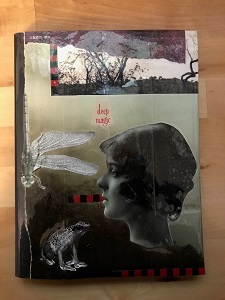
Alisa’s dream notebook
Alisa: Even now that we live in different states, it can still feel very side by side… like when we text to give our little updates on our progress. “I wrote today” or a mini report on whatever little discovery or shift unfolded.
Ashley: That always helps me to really impress upon myself the iterative nature of this process. The incremental growth and the bursts and shifts, the coming back around to questions. I never get tired of talking about writing with you! That’s why we’re going to have such an amazing time with our writers at Highlights. Yes, it’s about sharing our wisdom, but most of all it’s about hosting an experience that none of us could have on our own… co-creating the learning experience. And there will be collaging and great exercises in our notebooks…
Alisa: Plus history, science, interviewing techniques, [and] not to mention the awesome details that we can rake up from the world around us.
Ashley: Why don’t we talk for a bit about why we wanted to do THIS workshop specifically?
Alisa: I think the idea started when we had our writing weekend in the fall…
Ashley: We were talking about our dream workshop, and about what would bring our particular strengths to the fore. You and I both have a lot of strategies for building narrative worlds from small seeds, whether those are from history or an overheard story or something we’ve gleaned from our other interests.
Alisa: We sketched it out so quickly! I remember us drinking coffee and gobbling down hot biscuits, and the ideas were leaping out of us faster than we could write them down. We just play off each other so well. It’s not just the mutual support. Our ideas actually get better as we toss them back and forth. You know how they say your romantic partner should be someone who ‘makes you a better person’? I think as creative partners we make each other better writers. There’s just this synergy. Like peanut butter and chocolate. Mmm, chocolate…
Ashley: And speaking of treats, could I put in a request for carrot cake? Chef Amanda made a really excellent one last time I was there.
Alisa: I’m sure that’s possible… The Highlights Foundation feeds writers on all levels.
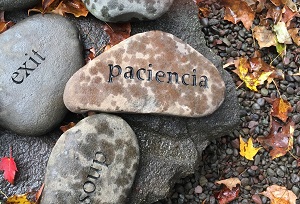
PACIENCIA in the word garden
Ashley: Such warmth and sweetness. I love settling into rooms and chairs and paths where so many writers at different stages have brought their passion, attention, and talents. And I have a rock in the word garden! It says “paciencia.” I’m very proud of it. I think I did learn some patience and gentleness during my time there. I can’t say enough about the natural beauty of the place, either.
Alisa: As long as you avoid the bears.
Ashley: That’s right… you have a bear story! Please tell it!
Alisa: We don’t want to scare people away. I’m sure it was a very nice, very friendly bear. Or bears.
Ashley: You will not escape our time together without telling this story, understood? Oh, the fun we will have!
Alisa: Stories over meals, plus we are going to fill up our wells of creativity in so many ways. It will be practical but also deeply personal, idiosyncratic, messy. Because really, what you need to write is your own brain, your own emotion, and the courage to listen to your own inner voice. Sometimes that means getting tools and developing skills to help you pull off what you want to accomplish. But it also means finding new ways to look at the world. Seeing inspiration and then being [able] to follow that from first spark to narrative.
Ashley: I also think it’s so important to realize that the sparks are scattered all through the writing and revision process. Or, to put it another way, we have to keep re-sparking possibility, feeding in sources. I don’t just start with one source and expect to get everything for my story there. The book I’m working on at any given time is like a black hole that wants to suck the whole world into it. It’s like a hungry beast that demands to be fed sparks of inspiration, source material… Aagh, help me out; the metaphor is getting pretty mixed here.
Alisa: Another idea we’ll work with a lot is that sources aren’t just things. People can be great sources, too. If you find an expert, whether a scientist or a hairdresser, or just someone who’s lived a particular experience that you haven’t, that person can offer a perspective you can’t get by just looking up the facts. The truth is, people love to talk about their interests, experiences, passions, and histories, at least if you know how to get them started. I do this a lot for my nonfiction writing, so I’ll be teaching the group how to get the most out of an interview.
Ashley: A thread running though everything we have said is that this is about process. Developing intuition in the writing process, connecting forms of attention to our writing, discerning from among everything we see and hear and smell and feel what might feed productively into our stories. Stowing things away like mad little magpies.
Alisa: I love all the unusual prompts that we’ve gathered. I have some great visual prompts, and some shiny bits of intriguing science and history facts for us to work with. There will be a lot of exploratory writing together and sharing in the moment. I’m really excited about it.
Ashley: Yes! Generating material but holding it loosely. This is not going to be a critique space so much as a giant petri dish for growing possibility. People who have work in process may find themselves folding what they write in there; others may discover the seeds and sprouts for their next project.
Alisa: I kind of want to comment on the metaphors you are throwing out, but instead I’ll just say that I think this is what writers will take away from the workshop: how to generate story from whatever our attention or imagination snags on.
Ashley: Absolutely. And part of our facility with that process comes from the fact that both of us are big believers in keeping writing notebooks, where we gather all kinds of material we may use later… and we both have daily writing practices that turn everyday life into potential sources.
Ashley: Everyone needs to have a place to write down the source material they gather. That’s why we’re going to make beautiful, whimsical notebooks during our first evening workshop. We are going to start with magic and play and keep that going the whole time we’re together.
Alisa: It’s going to be a four-day inspiration party.
Ashley: Party, indeed! And I got to invite so many of my favorite people: wonderful you; my editor at Dutton, Andrew Karre (also a great friend); my librarian friend, Edi Campbell; and my rockstar kid lit scholar friend, Marilisa Jiménez García. I feel like a princess who gets to make a wish and magically assemble everyone she’d like to have dinner with. Plus the writers who are coming to learn with us. I can’t wait to meet them!
Alisa: Your students send their love, you know. I just gave a reading this weekend here in Bloomington, and one of your former students from the Whole Novel Workshop at Highlights was in the audience. She had such great things to say about her experience. She credited finishing her first novel to all the support and wisdom she got during the workshop.
Ashley: That’s how we roll… What did you say about writing friendships?
Alisa: Support. Showing up. Creative companionship.
Ashley: No bears?
Alisa: No bears!
Ashley: I hope some of our students find writing friends they’ll still be hanging out with in 10 years, like us.
Alisa: We’ll do our part… This enthusiasm has to be contagious.
Thank you, Alisa and Ashley, for your time and enthusiasm! (We’ll ask Amanda about the carrot cake!)

